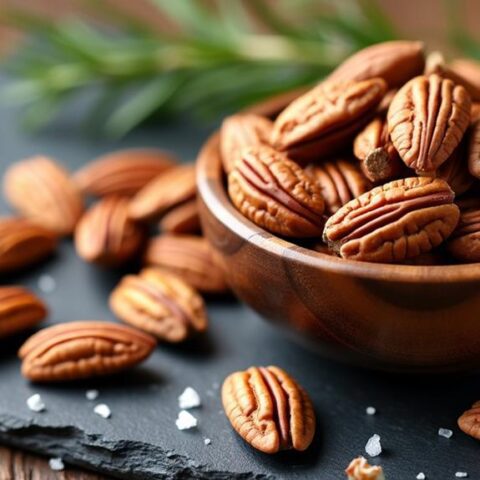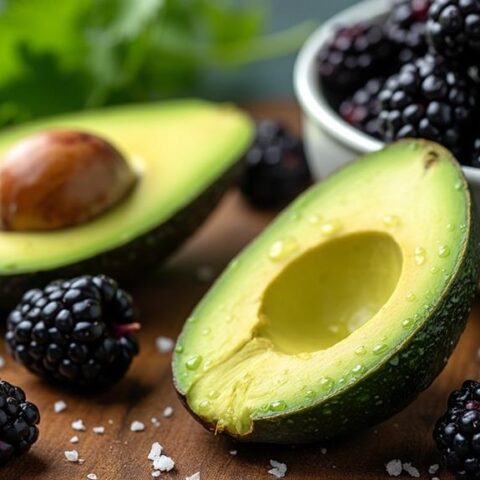
Coconut sugar is not a low-carb sweetener, containing approximately 100 grams of carbohydrates per 100-gram serving, similar to regular table sugar. While it offers a lower glycemic index of 35-54 compared to white sugar's 58-60, its high carbohydrate content makes it unsuitable for low-carb or ketogenic diets. The presence of trace minerals and inulin fiber provides minimal nutritional benefits, but careful portion control remains essential for blood sugar management. Understanding its complete nutritional profile reveals important considerations for dietary decisions.
Key Takeaways
- Coconut sugar is not low-carb, containing 100 grams of carbohydrates per 100-gram serving, similar to regular table sugar.
- Despite having a lower glycemic index (35-54), coconut sugar still significantly impacts blood sugar levels and disrupts ketosis.
- One teaspoon of coconut sugar contains 4 grams of carbohydrates, making it unsuitable for strict low-carb or ketogenic diets.
- Better alternatives for low-carb dieters include sugar-free sweeteners like stevia and erythritol, which don't impact blood sugar.
- While coconut sugar contains trace minerals, its high carbohydrate content outweighs potential nutritional benefits for low-carb dieters.
What Makes Coconut Sugar Different
The production process of coconut sugar sets it apart from conventional sweeteners in both its origin and composition. This natural sweetener is harvested from coconut palm tree sap through a traditional tapping method, followed by heating to create crystalline granules.
Unlike refined sugar, coconut sugar maintains a distinct nutritional profile with trace amounts of minerals including iron, zinc, and calcium.
While coconut sugar offers a lower glycemic index compared to regular table sugar, ranging from 35 to 54, it still contains significant carbohydrates at 4 grams per teaspoon.
Despite its natural origins and minimal processing, it remains categorized among added sugars and should be used with discretion. Its unique characteristics make it an alternative sweetener choice, though its impact on overall carbohydrate intake requires careful consideration.
Understanding the Carbohydrate Content
While coconut sugar enjoys popularity as a natural sweetener alternative, its carbohydrate content remains a crucial consideration for health-conscious consumers. Each teaspoon contains approximately 4 grams of carbohydrates, primarily in the form of various sugars, making it a significant source of carbs in any diet.
Despite having a lower glycemic index compared to regular table sugar, coconut sugar's overall carbohydrate content poses challenges for those following low-carb dietary protocols. A 100-gram serving delivers about 100 grams of carbohydrates, which can quickly impact blood sugar levels and exceed daily carb limits.
For individuals monitoring their carbohydrate intake for health reasons, including those on ketogenic diets, coconut sugar should be used sparingly or avoided altogether to maintain dietary goals.
Glycemic Index Comparison
While coconut sugar's glycemic index ranges from 35 to 54, placing it lower than refined white sugar's GI of 65, this difference may not greatly impact overall blood sugar management.
The presence of inulin fiber in coconut sugar contributes to its lower glycemic response, offering a modest advantage over refined alternatives regarding blood glucose spikes.
However, both natural coconut sugar and refined white sugar contain similar amounts of carbohydrates and calories, making the glycemic index advantage less meaningful for those following strict low-carb dietary protocols.
GI Ratings Between Sugars
Understanding glycemic index differences between sweeteners reveals coconut sugar's moderate position in the spectrum, with GI ratings typically falling between 35 and 54, compared to regular table sugar's higher range of 58 to 60.
This lower glycemic index suggests coconut sugar may have less immediate impact on blood sugar levels, partly due to the presence of inulin fiber, which can slow sugar absorption.
However, batch variations and individual responses make coconut sugar's GI less predictable than other sweeteners.
With 4 grams of carbohydrates per teaspoon, it remains a significant source of sugar that can affect blood glucose, particularly in larger amounts.
For those following low carb diets, coconut sugar's similarity to brown sugar in GI ratings indicates it should still be used sparingly, despite its slightly better glycemic profile.
Blood Sugar Impact Levels
Although coconut sugar has gained popularity as a natural sweetener, its blood sugar impact varies considerably from other common sweeteners in ways that merit careful consideration.
With a glycemic index ranging from 35 to 54, coconut sugar demonstrates a lower impact on blood sugar levels compared to regular table sugar's GI of 60. However, this advantage requires context, as coconut sugar still contains significant carbohydrates at 4 grams per teaspoon.
For individuals with diabetes or those monitoring their carbohydrate intake, moderation remains essential, as larger quantities can trigger notable blood glucose increases.
While the presence of inulin may slow sugar absorption, this effect doesn't eliminate the need for careful portion control, particularly for those managing blood sugar-related health concerns.
Natural Vs Refined GI
The glycemic index comparison between natural coconut sugar and refined table sugar reveals significant differences in their blood sugar impacts. While both sweeteners contain similar carbohydrate content, coconut sugar's GI rating of 35-54 demonstrates a slower absorption rate compared to regular sugar's 58-65 rating.
| Factor | Coconut Sugar | Regular Sugar |
|---|---|---|
| GI Range | 35-54 | 58-65 |
| Carbs/100g | 100g | 100g |
| Calories/100g | 375 | 375 |
| Inulin Content | Present | None |
| Blood Sugar Impact | Moderate | Higher |
Despite its lower glycemic index, coconut sugar should still be consumed in moderation due to its significant carbohydrate content. The presence of inulin may contribute to its reduced glycemic impact, though the overall difference in blood sugar management between the two sweeteners remains relatively modest.
Nutritional Profile and Benefits
While coconut sugar has gained popularity as a natural sweetener alternative, its nutritional composition reveals both advantages and limitations for health-conscious consumers.
With a glycemic index ranging from 35 to 54, coconut sugar offers a more gradual impact on blood sugar compared to regular table sugar. However, its nutritional benefits remain modest, providing only minimal amounts of trace nutrients like iron, zinc, and calcium.
At 15 calories and 4 grams of carbohydrates per teaspoon, coconut sugar's carbohydrate intake closely mirrors that of refined sugar. Despite retaining some natural minerals during processing, the overall nutritional advantages are limited, making moderation essential.
Health-conscious individuals should carefully consider these factors when incorporating coconut sugar into their diet, particularly those monitoring their carbohydrate consumption.
Impact on Blood Sugar Levels
While coconut sugar's glycemic index of 35-54 compares favorably to regular sugar's GI of 58, its impact on blood glucose levels remains significant due to its carbohydrate content of 4 grams per teaspoon. The presence of inulin in coconut sugar may offer some advantage by slowing sugar absorption, though research on its practical benefits remains limited. Individuals monitoring their blood sugar levels should approach coconut sugar with caution, treating it like other added sugars and consuming it in moderation to prevent unwanted glucose spikes. It is important to recognize that lower blood glucose levels achieved through dietary changes are crucial in managing metabolic health, especially for those with type 2 diabetes.
Glycemic Index Facts
Understanding glycemic index ratings reveals important distinctions between coconut sugar and regular table sugar, with coconut sugar typically scoring between 35 and 54 on the GI scale compared to regular sugar's higher rating of approximately 60.
While this lower glycemic index suggests coconut sugar may cause fewer blood sugar spikes, the presence of inulin fiber might contribute to slower sugar absorption in the bloodstream.
However, both sweeteners contain similar carbohydrate content, approximately 100 grams per 100 grams, which can considerably impact blood glucose levels when consumed abundantly.
For individuals with diabetes or those following low-carb diets, it's essential to note that despite its lower GI rating, coconut sugar remains a form of sugar requiring careful portion control and monitoring of personal glucose responses.
Managing Sugar Spikes
Despite coconut sugar's lower glycemic index compared to regular table sugar, its impact on blood glucose levels requires careful consideration and management.
With 4 grams of carbohydrates per teaspoon, coconut sugar can still trigger blood sugar spikes, particularly when consumed in larger quantities.
Individual responses to coconut sugar vary, and its effects on blood glucose can be significant, especially for people with diabetes.
While its glycemic index ranges from 35 to 54, making it appear more favorable than table sugar, moderation remains essential.
The presence of fructose in coconut sugar can lead to similar blood sugar responses as regular sugar, and excessive intake may result in hyperglycemia.
Understanding these factors helps consumers make informed decisions about incorporating coconut sugar into their dietary plans.
Comparing Blood Glucose Effects
Several key differences emerge when comparing the blood glucose effects of coconut sugar to traditional table sugar.
While coconut sugar has a glycemic index between 35 and 54, compared to regular sugar's 58, this difference may not translate to significant health benefits for those monitoring blood sugar levels.
Despite its lower glycemic index and the presence of inulin, which can slow sugar absorption, coconut sugar remains high in carbohydrates at 100 grams per 100-gram serving.
This makes it incompatible with low-carb diets and potentially problematic for blood sugar management.
Each teaspoon contains 4 grams of carbohydrates and 15 calories, which can quickly accumulate and impact blood glucose levels when consumed regularly.
Like all sugars, excessive intake can contribute to health concerns including obesity and diabetes.
Common Misconceptions About Natural Sweeteners
When it comes to natural sweeteners like coconut sugar, widespread misconceptions often lead consumers to make uninformed dietary choices. Many people mistakenly believe that coconut sugar's lower glycemic index makes it a safe option for controlling high blood sugar, despite its significant carbohydrate content of 100 grams per 100-gram serving. Another common misunderstanding is that natural sugars are inherently healthier or contain fewer calories than refined alternatives. In reality, coconut sugar provides approximately 15 calories per teaspoon, similar to regular table sugar. The "natural" marketing of coconut sugar can obscure potential health risks associated with overconsumption, including obesity and related chronic conditions. It's important to note that coconut sugar's high fructose content, similar to other sweeteners, can impair blood sugar control and disrupt ketosis. Understanding these misconceptions is vital for making informed decisions about sweetener choices in a balanced diet.
Coconut Sugar in Popular Diets
Understanding the role of coconut sugar in popular diets reveals essential insights for health-conscious individuals seeking to manage their carbohydrate intake.
While marketed as a natural sweetener, coconut sugar's carbohydrate content makes it incompatible with strict low-carb regimens like the ketogenic diet, which limits daily carbs to 20-50 grams.
- Paleo and Whole30 diets may permit coconut sugar in moderation as a natural alternative.
- Ketogenic dieters must avoid coconut sugar to maintain ketosis.
- Each teaspoon contains 4 grams of carbohydrates, quickly impacting daily limits.
- Sugar alternatives like stevia, monk fruit, and erythritol offer better options for low-carb lifestyles.
- Confusing ketoacidosis and ketosis can lead to misunderstanding the dietary needs of ketogenic followers.
Though coconut sugar has a lower glycemic index than refined sugar, its impact on carbohydrate totals requires careful consideration when following popular dietary protocols.
Best Practices for Consumption
The successful incorporation of coconut sugar into a low-carb eating plan requires careful attention to portion sizes and overall carbohydrate tracking.
With 4 grams of carbohydrates per teaspoon, coconut sugar can quickly consume a considerable portion of daily carb allowances, making moderation essential for maintaining blood sugar levels within target ranges.
To optimize coconut sugar consumption while following a low-carb lifestyle, individuals should measure portions precisely and consider limiting added sugars to no more than 20% of their daily caloric intake.
For those seeking to reduce carbohydrate impact further, switching to keto-friendly sweeteners like stevia or erythritol provides similar sweetness without considerably affecting blood sugar levels or total carb counts in recipes.
Health Risks and Considerations
Despite its reputation as a natural alternative to refined sugar, coconut sugar presents several health risks that warrant careful consideration, particularly for individuals following low-carb diets or managing blood sugar levels.
While its glycemic index is lower than regular sugar, coconut sugar can still greatly impact blood glucose levels and contains substantial carbohydrates that make it incompatible with low-carb dietary requirements.
- Contains 4 grams of carbohydrates per teaspoon, making it unsuitable for ketogenic diets
- Can spike blood sugar levels despite moderate glycemic index ratings
- Contributes to potential weight gain with 375 calories per 100 grams
- May increase risk of chronic diseases when consumed in excess
Health experts emphasize that moderation is vital, recommending that coconut sugar consumption should not exceed 20% of daily caloric intake to minimize health risks.
Alternative Low-Carb Sweeteners
For individuals seeking to reduce their carbohydrate intake while maintaining sweetness in their diet, several scientifically-proven alternatives to coconut sugar offer compelling benefits. Among these low-carb sweeteners, stevia and monk fruit stand out as natural options that contain zero net carbohydrates and don't affect blood sugar levels.
Erythritol, with merely 0.2 calories per teaspoon, provides another reliable substitute for those following low-carb diets.
When looking to replace coconut sugar in recipes, combining stevia with erythritol can create an ideal balance of sweetness while maintaining minimal carbohydrate content.
Additional options include allulose, which contains just 0.4 calories per gram, and xylitol, which, despite its slightly higher caloric content, still maintains a low glycemic impact suitable for carb-conscious individuals.
The ketogenic diet's mechanisms of ketosis enable the body to efficiently burn fat by converting fats into ketone bodies, which can serve as an energy source, making it an excellent approach for those on a low-carb regimen.
Baking and Cooking Applications
While coconut sugar adds depth and complexity to baked goods with its caramel-like notes, its high carbohydrate content requires careful consideration in low-carb cooking applications. When incorporating coconut sugar into recipes, bakers following low-carb diets must carefully measure portions, as each teaspoon contains approximately 4 grams of carbohydrates.
Its behavior in recipes mirrors that of traditional sugars, contributing to browning and moisture retention in baked goods.
- Functions as a direct 1:1 substitute for brown sugar in recipes
- Affects moisture content and browning similarly to regular sugar
- May require cooking time and temperature adjustments
- Crystallizes like conventional sugar, making it suitable for various cooking applications
Understanding these properties helps home cooks make informed decisions when adapting recipes to maintain their low-carb lifestyle while still achieving desired results in their baked goods.
Storage and Shelf Life
Proper storage techniques play an essential role in maintaining coconut sugar's quality and extending its usability. When stored correctly in an airtight container and kept in a cool, dry place, coconut sugar maintains its granulated texture and can last up to 24 months.
This natural sweetener requires careful attention to storage conditions to prevent moisture exposure, which can lead to unwanted clumping and hardening.
Unlike conventional sugars, coconut sugar is susceptible to absorbing aromas from nearby foods, making it vital to store it away from strong-smelling items.
Reading Product Labels
Understanding product labels for coconut sugar requires careful attention to the nutrition facts table, which provides essential information about carbohydrate content and serving sizes.
Consumers should be vigilant about identifying hidden sugar names in ingredient lists, as some manufacturers combine coconut sugar with other sweeteners.
Net carb claims deserve particular scrutiny, as these calculations can vary between brands and may not accurately reflect the product's impact on blood sugar levels.
Understanding Nutrition Facts Tables
Mastering the art of reading nutrition facts tables empowers consumers to make informed decisions about coconut sugar and other food products in their low-carb journey.
When examining labels, focus on total carbohydrates, which encompasses all carbs including sugars and fiber. Understanding serving sizes helps compare products accurately, while checking the ingredient list reveals coconut sugar's prominence in the formula.
- Look for total carbohydrates first to assess overall carb content
- Compare serving sizes between similar products for accurate assessment
- Check the sugars subcategory to understand potential blood sugar impact
- Review ingredient list position of coconut sugar to gauge its concentration
The nutrition facts table serves as an essential tool for evaluating whether coconut sugar aligns with specific dietary goals and restrictions.
Spot Hidden Sugar Names
Beyond the nutrition facts panel, product labels harbor numerous sugar variants that manufacturers cleverly incorporate into their ingredients. When examining labels, consumers should watch for hidden sugars listed under names like sucrose, fructose, glucose, and high-fructose corn syrup, all of which contribute to carbohydrate content.
Natural sweeteners, including coconut sugar and agave nectar, contain similar carbohydrate levels to refined sugars, with coconut sugar providing 4 grams per teaspoon.
Understanding ingredient order is essential, as items listed first appear in larger quantities. While sugar alcohols like erythritol may seem like better alternatives with zero net carbs, they can cause digestive issues in some individuals.
Products marketed as healthy may still contain significant sugar content through ingredients like cane sugar and corn syrup.
Check Net Carb Claims
A careful examination of net carb claims on product labels reveals that coconut sugar contributes considerably to total carbohydrate content, with each teaspoon containing 4 grams of carbs.
When evaluating products containing coconut sugar, consumers should scrutinize ingredient lists for hidden refined sugars that may affect blood sugar levels and overall carbohydrate content.
- Each teaspoon of coconut sugar contains approximately 15 calories and 4 grams of carbohydrates
- Products labeled "low net carbs" may still contain significant amounts of added sugars
- Coconut sugar's glycemic index ranges from 35 to 54, impacting blood glucose
- Manufacturers sometimes blend coconut sugar with other sweeteners, altering its carbohydrate profile
Understanding these factors helps consumers make informed decisions about coconut sugar consumption, particularly for those monitoring their carbohydrate intake or blood sugar levels.
Managing Sugar Intake Effectively
Successfully managing sugar intake requires a strategic approach when incorporating coconut sugar into a low-carb lifestyle. While coconut sugar boasts a lower glycemic index than regular sugar, health experts emphasize that its carbohydrate content still greatly impacts blood sugar levels and overall carbohydrate intake. To effectively manage weight and maintain a low-carb diet, individuals should carefully monitor their coconut sugar consumption, keeping it within the recommended limit of 20% of total daily calories. This involves reading product labels thoroughly, as some manufacturers blend coconut sugar with other sweeteners. A practical approach includes measuring portions precisely, tracking daily carbohydrate intake, and considering alternative sweeteners that better align with low-carb dietary goals. It's also crucial to differentiate between total and net carbohydrates to ensure accurate tracking and adherence to low-carb limits.
Frequently Asked Questions
Is Coconut Sugar Good for a Low Carb Diet?
Despite its lower glycemic index, coconut sugar's high carbohydrate content makes it unsuitable for low-carb diets. Better alternatives include natural sweeteners like stevia or monk fruit, which provide minimal carbs.
What Is the Safest Low Carb Sweetener?
Natural sweeteners like stevia, monk fruit, and erythritol rank among the safest sugar alternatives, offering health benefits with minimal glycemic index impact, zero calorie content, and keto-friendly properties for blood sugar management.
What Are the Negatives of Coconut Sugar?
Coconut sugar's high carbohydrate content, similar glycemic impact to regular sugar, and potential for overconsumption pose health risks. Despite minimal nutrient content, it lacks significant benefits compared to other alternative sweeteners.
Does Coconut Sugar Spike Your Blood Sugar?
Coconut sugar can spike blood sugar levels, though its lower glycemic index causes a slower insulin response compared to regular sugar. As a natural sweetener, its health effects still warrant moderation.
Conclusion
While coconut sugar offers trace minerals and a lower glycemic index compared to regular sugar, it remains high in carbohydrates and should not be considered a low-carb sweetener. Those following restrictive diets or managing blood sugar levels should use it sparingly, treating it as any other sugar. Understanding product labels, proper storage techniques, and mindful portion control remain essential for incorporating coconut sugar into a balanced diet effectively.










No Comments